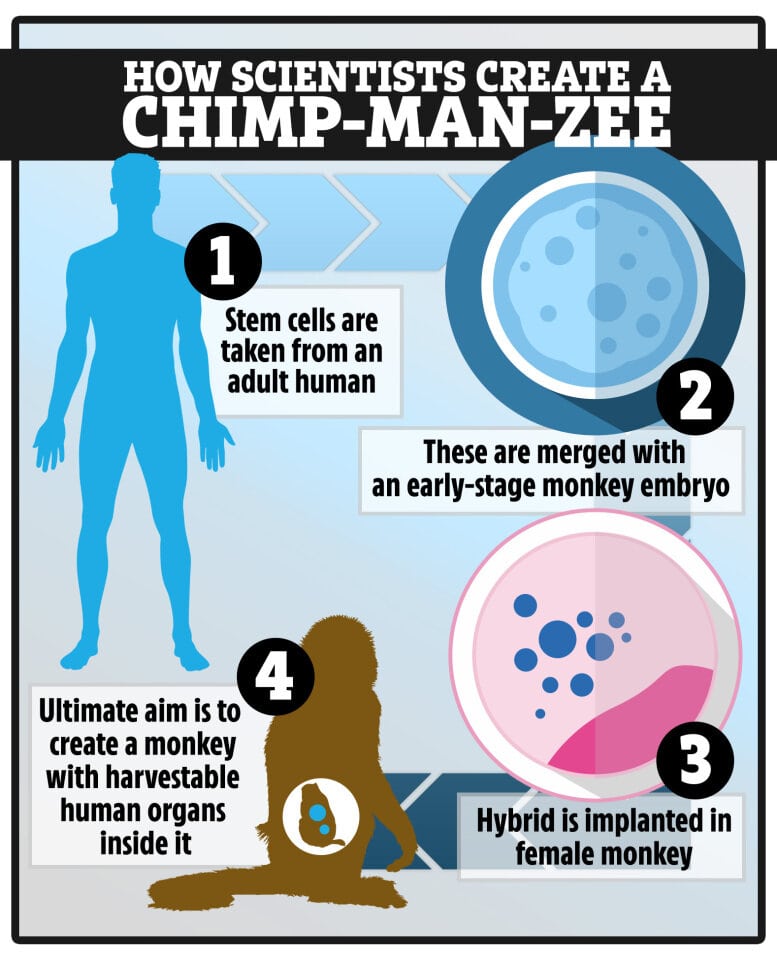
The latest experiments in China and Japan should really make us question how far do the boundaries of the “humane” go and whether we have not already gone beyond. What is your opinion?
No! This is not a trailer for a popular science fiction movie.
These are facts presented to us by scientists from China.
And yes, the title is correct – a team of researchers created embryos that are part human and partly ape, in other words, human hybrids or a human-monkey chimera.
Choose whichever sounds better to you.
Their ultimate goal is to create an animal with a fully human kidney or liver through startling experiments.
The purpose of these controversial experiments is the possibility for such primates to be used as sources of organs for transplantation.
Modern human hybrids
The technique involves injecting human embryonic stem cells into a one-day-old embryo. The hope is that human cells will grow along with the embryo. Some time ago, an attempt was made to add human cells to pig embryos, but the former was not retained effectively.
The hope for success in the current experiments was the similar genetic endowments of monkeys to those of humans. To give human cells a better chance of persisting and developing, scientists are also used gene-editing technology. Thus, they prohibited the formation of certain types of cells in animal embryos. So far, no monkeys with mixed genes have been born. Instead, the mixed embryos were developed in the laboratory in just two weeks in 2019.

The creature was reportedly able to grow and be born, but scientists interrupted the process. The team, made up of members of the Salk Institute For Biological Studies in the United States and the Catholic University of Murcia, succeeded in genetically modifying monkey embryos.
The researchers deactivated the genes that made up the organs and replaced them with human stem cells. They hope that one day these hybrid organs will be transplanted into humans.
On the other hand, a researcher from previous experiments with pigs believes that current experiments will not lead to success, as the organs that will develop would be tiny. In the United States, federal funds can never be used to create mixed human-ape embryos. However, there is no such rule in China, which is probably why research is being conducted there.
Similar Worrying Experiments
Another curious fact is that in 2019, Japan became the first country to approve experiments with human cells and animal embryos. The Japanese government intends to allow researchers to look for ways to grow organs for transplantation.
Biologist Hiromitsu Nakauchi had been waiting for more than a decade to get permission from the government for his experiments. As a leading stem cell researcher at the universities of Tokyo and Stanford, Nakauchi has already experimented with pig and sheep embryos.
According to him, no success should be expected to create hybrid human organs in the coming years, but research will develop a lot. The experiments will begin with the injection of human-induced pluripotent stem cells into embryos of rats and mice that have been genetically engineered so that they cannot develop a pancreas.
The goal is for the rodent embryo to use human cells to build the pancreas. The team plans to monitor how these animals develop and grow for two years. Only if successful will permission be granted for the same experiments with pigs.
Also, if Nakauchi and his team find that more than 30% of rodent brains are of human origin, they will immediately stop the experiment. These are part of the government’s conditions for preventing the emergence of a “humanized” animal.
A personal opinion on the matter
The injection of human cells into monkey embryos and other species raises questions about evolutionary and interspecific barriers. To what extent do we have the right to cross certain borders?
And whether in the end, the attempts to find a way out of the shortage of organs for transplantation will not be a bad joke.
To what extent can such interventions in nature and its creatures be controlled?